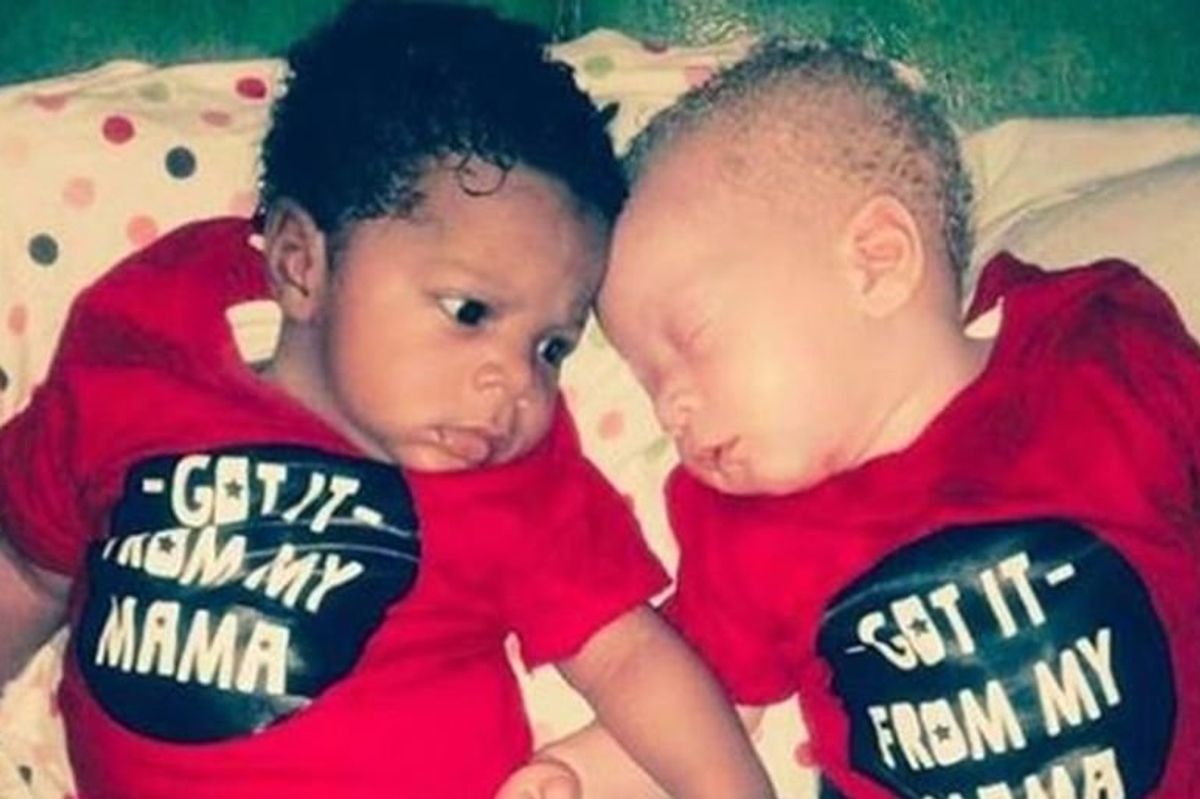One's White. The other's Black. But their mom wants you to know they're still identical twins.
Genetics are cool.

Identical twins Daniel and David as infants.
On February 26, 2019, Stacy and Babajide Omirin of Lagos, Nigeria got quite the shock. When Stacy delivered identical twins through C-section one came out black and the other, white.
The parents knew they were having identical twins and expected them to look exactly the same. But one has an extremely pale complexion and golden hair.
"It was a massive surprise," Stacy told The Daily Mail in late 2019. "Daniel came first, and then the nurse said the second baby has golden hair. I thought how can this be possible. I looked down and saw David, he was completely white."
"I called my husband in so he could see what we had here," she continued, "I didn't understand. He couldn't believe what he saw either. They are so adorable and it felt like we had been given a miracle."
The boys' father was overjoyed when he saw the unique pair arrive into the world.
"Their dad was really overwhelmed and immediately named My Twin 2 (David) 'Golden,' so he fondly calls him Mr. Golden," Stacy told Bored Panda in 2020. "He was all overjoyed seeing his boys. He stood for more than 10 minutes staring at them and said he was just looking at God's wonderful work and that they are his best gift ever."
David was born with a condition called oculocutaneous albinism (OCA). An estimate from an older study suggested that one in 17,000 births were affected by the condition each year worldwide, but many now find the data outdated. A 2023 study was conducted to find a more accurate number, with results showing that findings depended on country, population rates, and other local, cultural factors. By continent, African studies were disproportionately represented. The mean prevalence of OCA in four African counties, however, was one in 4,264, while the mean prevalence across three European countries was one in 12,000.
Oculocutaneous albinism occurs when the body produces little or no melanin, resulting in a lack of hair pigment and light skin. It can also cause vision problems, but Stacy says Daniel is perfectly healthy.
According to The United Nations, people with albinism face "multiple forms of discrimination worldwide" but information on physical attacks on people with albinism mainly comes from countries in Africa. A 2023 study published in Taylor & Francis Online explored the stories of persons with albinism in Nigeria to understand the unique experiences and dangers they face. One point of interest claims that "because albinism is poorly understood in Nigeria, persons with albinism are often subjected to stigma and discrimination.
The twins are often the center of attention when the family goes out in public, so they started an Instagram page to create awareness about their unique family. "We opened an account for them because we believe they have a story to tell to the world," Stacy said.
"I have to answer questions all the time when we are out. People say ''excuse me madam, which one of the kids is yours?''" she said. "I just say both of them are mine and people look at me as if I am joking."
Some women have told the family that they pray at night in hopes of having twins like Daniel and David. "They are special to everyone and I love them. It feels special to be their mother because they are a special kind of twins," Stacey said.
"I believe I am blessed and I am so proud of them."
In February 2025, Daniel and David celebrated their sixth birthday.
Both boys now wear glasses and, as they continue to grow, there's no denying these two are identical—and adorable.
This article originally appeared five years ago. It has been updated.



 Teens hanging out in a living room.via
Teens hanging out in a living room.via  Teenagers eating pizza.via
Teenagers eating pizza.via  Teenagers eating pizza.via
Teenagers eating pizza.via 

 Student smiling in a classroom, working on a laptop.
Student smiling in a classroom, working on a laptop. Students focused and ready to learn in the classroom.
Students focused and ready to learn in the classroom.
 Abraham Lincoln portrait by Alexander Gardner in 1865.
Abraham Lincoln portrait by Alexander Gardner in 1865.
 Fish find shelter for spawning in the nooks and crannies of wood.
Fish find shelter for spawning in the nooks and crannies of wood.  Many of these streams are now unreachable by road, which is why helicopters are used.
Many of these streams are now unreachable by road, which is why helicopters are used. Tribal leaders gathered by the Little Naches River for a ceremony and prayer.
Tribal leaders gathered by the Little Naches River for a ceremony and prayer.